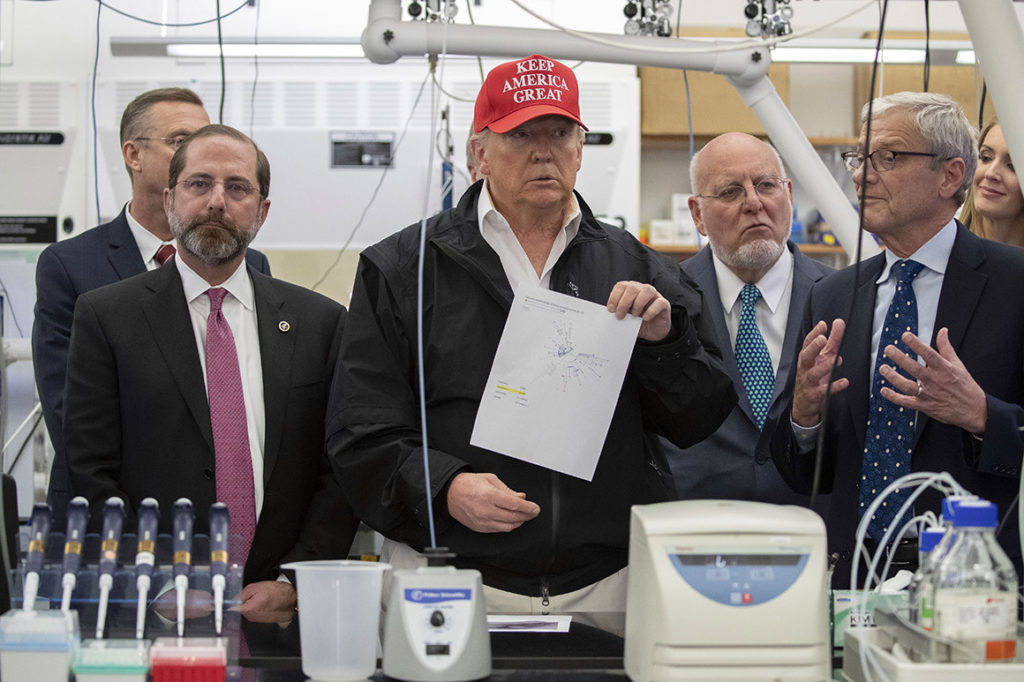Coronavirus Has Been Politicized to Dangerous Effect II
These decisions should be made by professionals.

Yet more evidence that political considerations are trumping medical assessments in our nation’s handling of COVID-19.
AP (“Official: White House didn’t want to tell seniors not to fly“):
The White House overruled health officials who wanted to recommend that elderly and physically fragile Americans be advised not to fly on commercial airlines because of the new coronavirus, a federal official told The Associated Press.
The Centers for Disease Control and Prevention submitted the plan this week as a way of trying to control the virus, but White House officials ordered the air travel recommendation be removed, said the official who had direct knowledge of the plan. Trump administration officials have since suggested certain people should consider not traveling, but they have stopped short of the stronger guidance sought by the CDC.
The person who spoke to the AP on condition of anonymity did not have authorization to talk about the matter. The person did not have direct knowledge about why the decision to kill the language was made.
In a tweet, the press secretary for Vice President Mike Pence, Katie Miller, said that “it was never a recommendation to the Task Force” and called the AP story “complete fiction.”On Friday, the CDC quietly updated its website to tell older adults and people with severe medical conditions such as heart, lung or kidney disease to “stay home as much as possible” and avoid crowds. It urges those people to “take actions to reduce your risk of exposure,” but it doesn’t specifically address flying.
Pence, speaking Saturday after meeting with cruise ship industry leaders in Florida, targeted his travel advice to a narrower group: older people with serious health problems.
“If you’re a senior citizen with a serious underlying health condition, this would be a good time to practice common sense and to avoid activities including traveling on a cruise line,” Pence said, adding they were looking to cruise line officials for action, guidance and flexibility with those passengers.
Health and Human Services Secretary Alex Azar suggested older Americans and those with health problems should avoid crowds “especially in poorly ventilated spaces.”
For most people, the flu-like viral illness causes only mild or moderate symptoms, such as fever and cough. But — like the flu — it can cause pneumonia and be much more lethal to people made frail by old age and by conditions that make it harder for their bodies to fight infections.
Dr. Peter Hotez, dean of tropical medicine at Baylor College of Medicine, this week warned U.S. lawmakers against minimizing the viruses risk for vulnerable people. During a Congressional hearing, he said the coronavirus “is like the angel of death for older individuals.”
Some experts this week said clearer and louder guidance should be made to vulnerable people, so they take every possible step to avoid settings where they might more easily become infected.
“The clear message to people who fit into those categories is; ‘You ought to become a semi-hermit. You’ve got to really get serious in your personal life about social distancing, and in particular avoiding crowds of any kind,'” said Dr. William Schaffner, a Vanderbilt University expert on infectious diseases.That can include not only avoiding essential commercial travel but also large church services and crowded restaurants, he added.
Dr. Tom Frieden, a former CDC director, said whether to recommend the frail and elderly avoid air travel is “a difficult question,” but clearly this is a time when such conversations should be taking place.
POLITICO (“Trump’s mismanagement helped fuel coronavirus crisis”) :
On Friday, as coronavirus infections rapidly multiplied aboard a cruise ship marooned off the coast of California, health department officials and Vice President Mike Pence came up with a plan to evacuate thousands of passengers, avoiding the fate of a similar cruise ship, the Diamond Princess, which became a petri dish of coronavirus infections. Quickly removing passengers was the safest outcome, health officials and Pence reasoned.
But President Donald Trump had a different idea: Leave the infected passengers on board — which would help keep the number of U.S. coronavirus cases as low as possible.
“Do I want to bring all those people off? People would like me to do it,” Trump admitted at a press conference at the CDC later on Friday. “I would rather have them stay on, personally.”
“I don’t need to have the numbers double because of one ship that wasn’t our fault,” Trump added, saying that he ultimately empowered Pence to decide whether to evacuate the passengers.For six weeks behind the scenes, and now increasingly in public, Trump has undermined his administration’s own efforts to fight the coronavirus outbreak — resisting attempts to plan for worst-case scenarios, overturning a public-health plan upon request from political allies and repeating only the warnings that he chose to hear. Members of Congress have grilled top officials like Health and Human Services Secretary Alex Azar and Centers for Disease Control Director Robert Redfield over the government’s biggest mistake: failing to secure enough testing to head off a coronavirus outbreak in the United States. But many current and former Trump administration officials say the true management failure was Trump’s.
[…]
Azar had concluded that the new coronavirus posed a public health risk and tried to share an urgent message with the president: The potential outbreak could leave tens of thousands of Americans sickened and many dead.
But Trump’s aides mocked and belittled Azar as alarmist, as he warned the president of a major threat to public health and his own economic agenda, said three people briefed on the conversations. Some officials argued that the virus would be no worse than the flu.
Azar, meanwhile, had his own worries: A clash with Medicare chief Seema Verma had weakened his standing in the White House, which in December had considered replacements for both Azar and Verma.
“Because he feels pretty insecure, about the feuds within his department and the desire to please the president, I don’t know if he was in the position to deliver the message that the president didn’t want to hear,” said one former official who’s worked with Azar.The jockeying for Trump’s favor was part of the cause of Azar’s destructive feud with Verma, as the two tried to box each other out of events touting Trump initiatives. Now, officials including Azar, Verma and other senior leaders are forced to spend time shoring up their positions with the president and his deputies at a moment when they should be focused on a shared goal: stopping a potential pandemic.
“The boss has made it clear, he likes to see his people fight, and he wants the news to be good,” said one adviser to a senior health official involved in the coronavirus response. “This is the world he’s made.”
There’s a whole lot more at the link.
At this point, I guess, we shouldn’t be shocked about this bizarre and toxic management style. That it’s particularly unsuited for an unfolding public health crisis is obvious.
But here’s the thing: why are these decisions going through the White House at all?
There are big decisions related to this sort of crisis that can only be made by elected officials. Presidents, governors, and mayors—not regulators—should decide, for example, whether to order conventions canceled, flights canceled, cruise ships suspended, and the like. They’re simply too impactful on the national and local economies that the calculations require political judgment and high-level authority.
But it’s not—or at least, it shouldn’t be—up to the President to approve recommendations for best practices from the FDA, CDC, and the like. Whether people should wash their hands for 30 seconds or 20 isn’t a political calculation but a scientific one.
Obviously, it would be preferable to have a more stable President at a time like this. Amplifying particular recommendations from the bully pulpit of the White House could help save lives and provide reassurance.






I recently commented that a leading indicator of serious political failure in the USA was Bush II – not for just the usual reasons, but because his very experienced cabinet failed totally under a bad President.
It was clear that whether the President is competent or not would steer the US government even down on the lower levels.
Good God, that Politico piece…we are well and truly fucked.
Most of us will get this. Fortunately, most of us will recover.
But.
We will all know someone who dies. Maybe not someone that close to us–a friend of a friend perhaps, or someone we’ve seen a few times at work–but we will know someone.
Sadly, some of us will lose someone near and dear, a parent or other close relative. I fear for my mom, who’s nearing 80 and has a lifelong history of respiratory problems. She is at the highest risk.
And to think were it not for the utter pigheaded narcissism of our worthless President, the impact would be so much less…it’s infuriating.
A prince who is not himself wise cannot be wisely advised… good advice depends on the shrewdness of the prince who seeks it— Machiavelli
But the American public feels more comfortable electing a leader with whom they’d like to share a beer.
I fixed the run on sentence for you James.
Trump lied about and covered up for, a Russian intelligence op against our elections.
He lied about the injuries inflicted by Iranian missiles in Syria.
He lied about Kim Jong Un’s nuclear capabilities.
He’s lying about coronavirus. Surprise.
He’s lied about just about everything. Trump literally – and yes, I do mean literally literally – does not know the difference between what he wants to be true, and what is true. That switch does not exist in his brain. Truth is whatever he says it is. For the millionth time, he is a psychopath, (sub-category stupid psychopath) and he always acts in character, he never rises to the occasion, it isn’t in him and it never will be.
Fortunately he has a Vice President. . . Oh, never mind.
Where are our resident culties, by the way? They seem to avoid threads having to do with coronavirus.
For another, even more critical take on Tiny’s CDC performance.
Tiny of 20 years ago would have had these impulses and stifled them, as he could recognize the damage they could cause him. His mental deterioration has removed the guard rails and he only emotes now.
It would be useful to have some guidance on proper action if symptoms develop. I’m in my mid-seventies. When should I seek medical attention? A drippy nose, a cough, a fever? If I meet criteria for seeking attention, do I just walk into a ER? Do my local medical facilities have a protocol to intercept possibly infected people in order to minimize risks to their staff and other patients? How long does it take from me hitting the door to getting a test result? A statement from an authoritative source would be nice.
@James:
The simple, and disconcerting answer, is this is a direct illustration of Trump’s real authoritarian instincts.
@Slugger: All are excellent questions and there have been no answers to my knowledge.
@Slugger: I can give you the Washington State guidelines, as I remember them.
1. Contact your doctor if you have a cough and a fever, and let them decide if they need to see you.
2. Self-quarantine in either case for 14 days after fever goes away.
3. If you are having difficulty breathing, call 911 and get an ambulance
4. Don’t worry too much about testing — we don’t have a treatment, so it won’t affect your care or lack thereof.
5. If you are over 60 or have underlying health conditions, cut human contact as much as possible, welcome to hermit-life.
@Slugger: The doctors and health dept. here are telling people to stay home if they have a fever, sore throat, recurrent coughing or sneezing*. Use common sense, drink fluids, and get rest. Vitamin C and Vitamin D can help. Oranges and tangerines are still in season. Sit out in the sun for Vitamin D. In other words, do what people used to do. The last place people need to be are doctors office waiting rooms and hospitals. Flu 2020 US: 13,000,000 cases, 6, 600 deaths.
* We call that the “crud” around here.
@Slugger: these questions are lacking clear guidance, mostly because our knowledge about, and ability to manage the pandemic at both a patient and a systemic level are changing almost daily. So, for right now, the best answers to your questions are:
1) I’m in my mid 70s: you are in a high risk group, especially if you have cardiac, respiratory, or immunological comorbidities (including if you are on an medication that suppressed the immune system). Minimize contact with other people. if someone can shop for you so much the better. If anyone visits you/brings you supplies, they should be healthy and preferably without any sick contacts. Wash your hands well. Disinfect any high touch surfaces.
2) when to seek medical attention: the CDC says you should seek medical attention if you have a fever or cough. Realistically, since there is no specific treatment, unless you are sick enough to be hospitalized, or seem like you could quickly become that sick, you will likely be sent home to “self quarantine,” so seeking care may be more hassle and potential harm than it is worth. If you aren’t infected you could become so at the hospital, and if you are infected you could infect others. if you do have symptoms and leave the house it would be good for you to wear a mask to contain any infectious droplets you might cough or sneeze. If you aren’t sick and need to leave the house a mask almost certainly won’t help. I would say that if you are having trouble breathing or are getting rapidly worse seeking medical care makes sense.
3) do I just walk into my ED: I bet your local hospital has information about this on their website front page. Different facilities are managing this differently depending on patient load and resources. Also how good their local team is at managing all these details. If you need to call 911 please make sure you tell the dispatcher that you are concerned that you have COVID. If you Have a personal physician they will probably be able to handle prescribing meds over the phone if, for example, a prescription cough syrup could be helpful.
4) how long for test results: at least 24 hours seems to be the norm right now, but this almost entirely irrelevant for your personal situation (but valuable for system response). Since there is no specific treatment for COVID a confirmed diagnosis doesn’t change what will happen for you. If you are sick enough to need inpatient care you will be admitted (assuming bed space) and if not you will he sent home with recommendations for symptomatic care. In fact, the chances of being tested at all seem pretty low anyway. Numerous reports of patients with likely infection that the department of health or CDC is refusing to run tests on because of resource constraints. It is not actually true that “anyone who wants one can get a test” regardless of what political leaders are saying. Actually a chest CT scan (not just a chest x-ray) is probably going to be the right answer to both make the diagnosis and determine the risk for severity of illness for the near future. The international radiology community is doing some really good work on this and a standard seems to be emerging.
Why should you believe any of that from some random guy commenting on the internet? Well, quite possibly you shouldn’t. Even more possibly the information will be out of date when you read it. But FWIW I’m a physician. So is my wife, and she is one of the leaders for her hospital’s response to this pandemic, so we are both reading and talking about this a lot every day. So my answers are informed both by primary source reading from WHO, CDC, and the open source primarily literature that is being published every day along with digests of this material being prepared by physician specialty societies, especially American College of Emergency Medicine.
Thanks to all who commented. Official guidance during this time would be appreciated. Here is one of our governments top officials:
https://nypost.com/2020/03/08/ben-carson-says-plans-for-coronavirus-stricken-cruise-ship-arent-fully-formulated/
@Tyrell: The 2018-19 flu season saw 42,900,000 people sick of which 61,200 died. We’re still gathering data on the 2019-20 season so it’s not relevant yet. The numbers should be lower as the flu vaccine was a good fit this year. Despite having a vaccine with good effectiveness so far the 2019-20 season has seen 34-49,000,000 people became sick with the flu of which 20-50,000 died and 350,000-620,000 required hospitalization…
It’s amazing how you can get basic facts AND numbers wrong so often…Maybe stop trusting whoever you got your numbers from??.. Or you know double check with the related authorities. In this case a quick trip to the CDC.gov website would of been enough to see 6,600 deaths is wrong.
@Matt: “CDC Reports 13 Million Flu Cases Thus Far in 2019-20 Season” US
“At this point in the season, CDC estimates indicate that there have been 13 million influenza illnesses, 120,000 hospitalizations, and 6600 flu-related deaths.”
That is from the website Contagion Live (January 18). I did not make any of these figures up. Since they referenced CDC, I figured they were accurate, but somewhat behind. I have also seen those figure on the ABC News site.
Given that it’s March, I wonder how many cases of allergies are going to end up panicking people.
Exercise moderately, eat a nutritious diet, get lots of sleep, and wash your hands. That’s probably the best you can do.
@Tyrell:
Yes, exactly. There is a highly effective (this year) flu vaccine that about half the population received. This greatly reduced both the number of flu cases and the percentage of those cases that developed complications, and yet 6,600 have still died from the flu this season.
COVID-19 is just as easy to transmit as the flu. It is something like 20 times as likely to kill those who contract it. And there is no vaccine.
Do you see why this has people worried?
@Tyrell: See here’s your problem. You could go directly to the CDC and look to see what they say or you can rely on an unverified second hand account. You chose to rely on an unverified second hand account because why?
https://www.cdc.gov/flu/about/burden/preliminary-in-season-estimates.htm
My numbers are directly from the CDC as you can clearly see..
This flu season isn’t over yet and it’ll take time after it ends before all the data is properly sorted and the calculations done.
@Kari Q: Yes you are correct that the flu vaccine for this season was a good match comparatively. Up to 52,00 people still died and the season isn’t over yet..
It’s unlikely a truly effective vaccine will be developed for SARS-CoV-2 as it has already mutated some with at least 2 strains of it circulating. We might be able to develop something that hurts it but it won’t last.
IT looks like this thing will get a chance to develop a foothold like other coronoviruses which means it’ll be a 24/7 365 day threat. Assuming no vaccine is found we could easily see +600k deaths a year which would make it deadlier to US citizens then all forms of cancer combined…